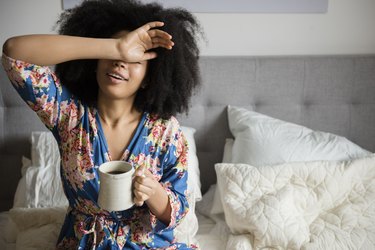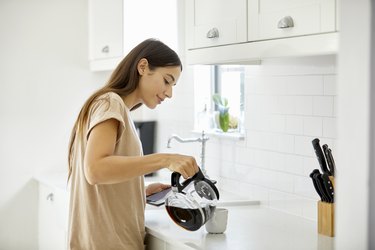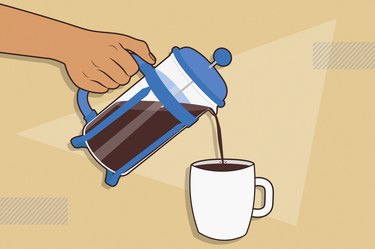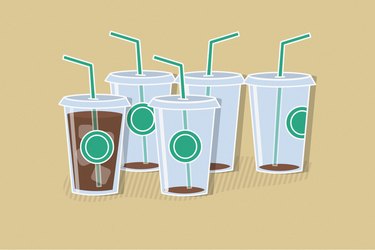
If there's one drink you expect to perk you up, it's coffee. The bitter beverage is a potent source of caffeine, a substance that naturally stimulates the nervous system.
Seven in 10 Americans drink coffee every week and 62 percent drink coffee every day, according to the National Coffee Association. If you're one of them, you may head straight to the coffee pot in the morning to get that jolt of energy needed to jumpstart your day.
Video of the Day
Video of the Day
A boost of energy is what you'd expect from coffee, but this isn't always the case. For some, coffee can make you feel sleepy.
"At first, you get a boost from the caffeine," says registered dietitian Keith-Thomas Ayoob, EdD, RD, FAND. "Then there's often a plunge in energy as the caffeine wears off and your blood sugar levels drop."
If you notice a decline in your energy levels after drinking coffee, here's why and what to do about it.
1. Sweeteners Can Cause Blood Sugar to Spike and Fall
A cup of black coffee contains 2 calories and no fat, carbs or protein, according to the USDA. Though coffee is naturally sugar-free, many people enjoy adding various sweeteners to detract from the bitterness. The sugar content in these sweeteners adds up quickly and could contribute to the sleepy side effects of drinking coffee.
"Depending on what people are adding to their coffee, their sweetener of choice may or may not be sending them on a blood sugar roller coaster," says registered dietitian and clinical herbalist Jenna Volpe, RDN, CLT. "This often looks like a quick burst of energy, followed by a mid-day slump."
Sugar in coffee also affects your insulin levels, leaving you feeling exhausted when your blood sugar levels plummet, according to the Cleveland Clinic.
"Excess sugar in coffee causes excess insulin to be released and the role of insulin to decrease glucose levels," says registered dietitian-nutritionist Mehak Naem, RDN. "Once glucose levels drop, you will feel tired and sleepy."
2. It Binds to Adenosine Receptors
Coffee's stimulating effects are largely due to the way it binds to adenosine receptors, according to a February 2010 review in the Journal of Alzheimer's Disease. Adenosine is an amino acid that is essential in sleep.
"Most people tend to get a quick burst of energy initially after drinking caffeinated coffee, but if they notice that drinking coffee is making them feel tired right away, they are likely experiencing a release of adenosine in the brain," Volpe says.
"Adenosine is an amino acid involved in sleep pathways. Caffeine initially blocks adenosine receptors, which is what induces a temporary sense of energy and alertness," Volpe explains. As you drink your cup of joe, the adenosine builds up, unable to bind to the receptors due to the caffeine.
"When the caffeine has been metabolized, it may cause some people to experience a rush of adenosine all at once," Volpe says — finally, all that excess adenosine that's built up can access the receptors and release sleep-inducing effects.
3. You're Drinking Coffee on an Empty Stomach
If you skip breakfast, it's likely that you drink coffee on an empty stomach.
Drinking coffee on an empty stomach significantly impairs blood sugar control, according to a small June 2020 study in the British Journal of Nutrition. Eating a meal, such as breakfast, before drinking coffee may prevent low blood sugar levels, which is associated with symptoms like fatigue, according to the Mayo Clinic.
How to Make Sure Your Coffee Perks You Up
Taste aside, the promise of increased energy levels is a driving force behind many morning coffee rituals. If you're experiencing the opposite effect — feelings of tiredness after drinking coffee — try adopting the following changes so your coffee is more likely to perk you up than put you to sleep.
1. Take It Black
Does drinking your coffee black help prevent that afternoon slump when the caffeine starts to wear off? Potentially. This has less to do with the caffeine in the coffee than the sugar content of whatever is added to it.
Foregoing the sugar-laden sweeteners in your coffee eliminates the risk of a sugar crash later on.
2. Use a Lower Glycemic Sweetener or Skip the Sugar
Table sugar has a glycemic index (GI) of 63, according to the Linus Pauling Institute. This is considered a medium GI. Eating high-GI foods is associated with a sharp increase in blood glucose levels that decline rapidly.
Opting for a lower glycemic sweetener like stevia or coconut sugar — or no sweetener at all — can go a long way to help reduce or prevent blood sugar rises and crashes throughout the day, Volpe says.
3. Drink Coffee With a Meal
Drinking coffee on an empty stomach could impair your blood sugar control, which could result in feelings of drowsiness. One way around this is having your coffee with your breakfast or other meal.
"Have coffee with food, preferably some protein and a little fat. Fat and protein can both blunt the spike in blood sugar. Instead, carbohydrates will gradually enter the bloodstream to prevent levels from dropping too low later on, giving you more sustained energy," Ayoob says.
- National Coffee Association: “NCA releases Atlas of American Coffee”
- MyFoodData: “Coffee”
- Mayo Clinic: “Afternoon Slump? 5 Ways to Restore Your Energy”
- Journal of Alzheimer’s Disease: “Caffeine and adenosine”
- National Institutes of Health: “Medicines: Common Questions Answered”
- British Journal of Nutrition: “Glucose control upon waking is unaffected by hourly sleep fragmentation during the night, but is impaired by morning caffeinated coffee”
- Mayo Clinic: “Hypoglycemia”
- Linus Pauling Institute: “Glycemic Index and Glycemic Load”


